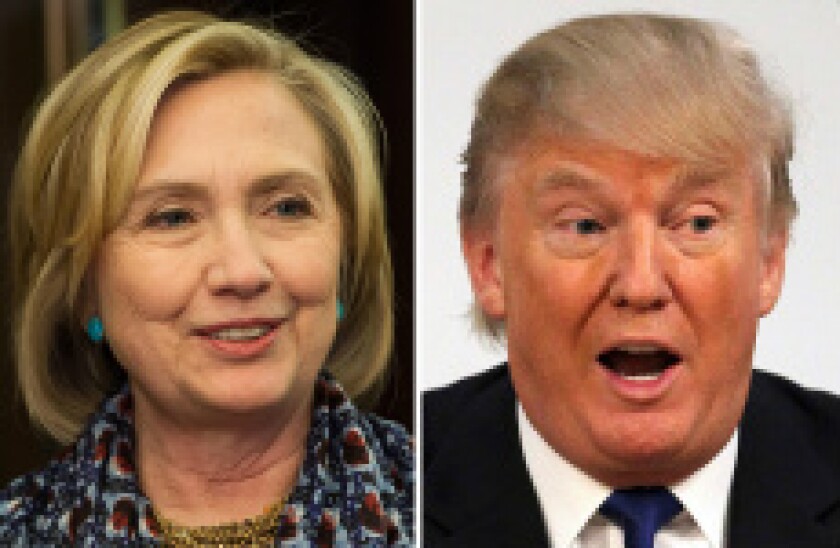Investment grade issuance was crammed into two days, with European public holidays at the beginning of the week obliging eight issuers to hit the market on Wednesday and Thursday.
High yield syndicate bankers were pumping out euro deals from Tuesday, as issuers pushed through deals ahead of election week and its expected volatility. If all of this week’s offerings are successfully priced, high yield issuance in these five days will represent half the volume of all high yield bonds printed in October.
Leading the pack was Synlab, which launched a €940m six year senior secured bond on Thursday — only five other high yield deals have been larger than €900m so far this year.
High yield bankers speaking to GlobalCapital said that the pipeline of new deals, bigger than expected during the first half of the year, has accelerated this week on news of shorter distance between the candidates to the US presidency, Hillary Clinton and Donald Trump.
“There might be a backlog of around €3bn or €3.5bn in high yield bond deals for the rest of the year, and just in this week we’re going to price more than €2bn,” said one leveraged finance banker. “It’s sort of a coincidence that some of these deals are coming ahead, but it’s clear that there is a sense of dread about a possible Trump win pushing them.”
A second high yield banker said he would advise clients to accelerate their deals before the US elections on the basis that uncertainty generates “expensive” volatility.
“There will be a shock if Trump wins,” he added. “Whether this translates into a worse environment than a Clinton victory in the long term is altogether another question.”
Caution has already begun to creep noticeably into the investment grade market. The Federal Bureau of Investigation’s announcement that it was reopening its investigation into Hillary Clinton’s use of a private email server prompted early than expected jitters among traders and investors.
That had a negative effect on deal execution for those investment grade issuers that did come to market this week, said one head of bond syndicate in London.
While all eight trades were taken down by investors, order books were in the main reduced, with only higher yielding deals pulling in multiple times oversubscription levels. The buy-side also showed a clear preference for shorter dated trades, showing increased price sensitivity on trades that carried duration risk.
“Issuers have been pushing deals through but it was probably a bit late, to be honest,” said the syndicate head. “It is unfortunate because if it were not for the FBI revelation, deals would have been done better. The FBI news got people focused on the US elections a few days earlier than they were set to be.”
While some see more pre-election windows for issuance if polls swing in Hillary Clinton’s favour, all agree that activity will be subdued between Friday and November 8.
There is also broad consensus on how the corporate bond market will behave post-election.
“Credit will be all right,” said one syndicate banker in London. “I think equities will have a big shock and suffer for a long time if Trump wins but after not too long credit will recover again. There is another scenario where Clinton wins by a thin margin, Trump contests it and then there is volatility again. If Hilary wins by a big margin then markets will be on fire.”
Market participants’ belief that the euro corporate primary market will snap back to issue friendly conditions is based on the aftermath of the UK’s June vote to leave the European Union.
Then, the strong technical combination of the European Central Bank’s Corporate Sector Purchase Programme and real money accounts’ high cash balances ensured that volatility lasted only a few days.
“Everyone is expecting that if Trump wins the market will recover after three days,” said Chris Telfer, portfolio manager at ECM Asset Management. “Whether it actually happens is another question, but everyone is so ingrained to buy on the dip that people expect volatility will be very short lived. In Europe, the cash market has been so bulletproof, not really moving any wider and showing no real weakness.”
While investors’ demand for corporate paper calmed in October, with the multiple times oversubscription levels of the early summer no longer commonplace, there is still a sturdy real money bid to support primary issuance. Rumbling along in the background is the steady ECB bid too.
The importance of yield
At this week’s Fund Selector Forum in Madrid, the talk about investment grade investors’ growing willingness to get their hands on corporate high yield debt was everywhere, as European fund managers gathered in the Spanish capital to discuss assets and strategies.
One of the attendees said that some investment houses had already expanded the flexible mandates on their fixed income funds in order to reach high yield paper.
This theme has slowly become stronger as European central banks pocket investment grade bonds and, as a result, their yields fall to levels at which fund managers have difficulty making good on their target returns.

